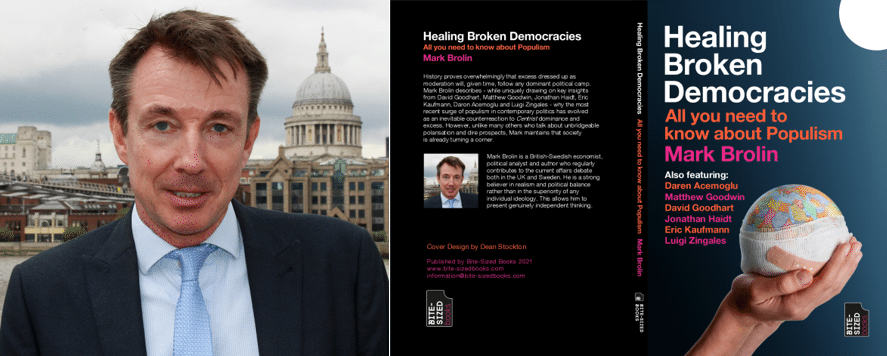Bite-Sized Books has just published Healing Broken Democracies – All you need to know about Populism. Available now on Amazon. The book offers in Mark’s own words, “…non-tribal intellectual clarity surrounding the populist phenomenon”.
Mark writes, “When did many voters who struggle to make ends meet start seeing the Labour party as part of “the metropolitan elite”? When did it yet again become acceptable within so called polite society, fashionable even, to dismiss disempowered voter groups as “uneducated throwbacks”?
The middle class, Brolin contends, has overtaken the working class as the politically dominant voter group. “Money talks and so does its twin brother: political dominance. It should come as no major surprise that “bourgeois” values are back in vogue. He takes a multidimensional approach, to great effect, to clarify what is going on. He starts out by interviewing six of the world’s most brilliant thought leaders, all of them approaching the current divide between the establishment and the people from different perspectives: Daron Acemoglu, David Goodhart, Matthew Goodwin, Jonathan Haidt, Eric Kaufmann and Luigi Zingales.
Readers are thereby offered, on a silver plate, a summary of much of the very best thinking presented in relation not only to Populism but to a broad range of fields.
Mark’s key argument, following the interviews, is that Populism has this time emerged as a result of Centrist overreach. However, he also argues that the majority of disillusioned voters are not really pushing back against Centrism per se – “only” against the overshoot features of Centrism.
This, he says, is one of several key reasons reconciliation is perfectly possible. Contrary to others’ talk about polarisation and unbridgeable divides Mark presents plenty of evidence that positive correction is already taking place – and that acknowledgment of the Centrist overreach problem is key to not only revitalising society but also Centrism itself.
About Mark Brolin
Mark Brolin is a British-Swedish political analyst, economist, commentator and author who has had the opportunity to work within both the public and private sectors. Well-known employers include the Swedish Foreign Ministry, OMX (Nasdaq) and Cantor Fitzgerald.
He is a regular contributor to the public debate in both the UK (for example The Telegraph, The Times, CapX, City AM) and Sweden (for example Expressen, Expressen TV, Göteborgsposten). He was employed by Cantor during the September 11 disaster (Cantor was the company most severely affected; 650 of his colleagues passed). This disaster proved a career turning point for him.
Analytically he started to also focus on the threats to a vital society. He has found that groupthink, when marketed by any political camp calling the shots for a long time, will eventually turn more destabilising to society than even terrorist attacks. Since external enemies are easy to unite against while easy to spot. Political camps with institutionalised powers, on the other hand, will typically move into excess terrain unknowingly. Division will inevitably follow given that the orchestrators of the overreach will typically be the last to notice the big picture effect. Mark has remained politically unattached while a strong believer in realism and political balance rather than in the individual superiority of any particular ideology.
So, in a genuinely independent capacity he has produced political and economic analysis, on three continents, on behalf of corporations, think tanks and research institutes. He is a regular speaker on topics such as democracy, populism, political trends as well as macroeconomic trends. Mark completed a master’s degree in Economics at the Stockholm School of Economics.

